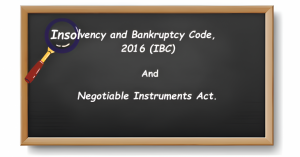DISHONOUR OF FUNDS AND ITS LEGAL REMEDIES
Introduction
A cheque is a type of negotiable instrument that can be easily encashed. It is defined under section 6 of the Negotiable Instruments Act, 1881 as ‘a bill of exchange on a specific banker and not expressed to be payable otherwise than on demand and it includes the electronic image of a truncated cheque and a cheque in the electronic form.’[1] The person who creates the cheque is referred to as the ‘Drawer’, while the individual to whom the cheque is addressed or the recipient of the cheque is known as the ‘Payee’. The entity that is instructed to make the payment, typically the bank, is termed the ‘Drawee’.
DISHONOUR OF CHEQUE
A cheque is considered dishonored when the Payee submits it to the bank for payment and it is subsequently returned unpaid from the bank account. It can be due to multiple reasons as:
- When the signature of the drawer does not match with that of the Cheque
- When the amount in words does not match with that of the numbers on the cheque
- When there is alteration, modification, or overwriting on the cheque
- When the validity of the cheque has expired
- When the cheque has been damaged
- When the drawer has used a cheque from an old chequebook which has been discontinued by the bank
But when the dishonour is due to insufficiency of funds in the drawer’s bank account, the cheque is bounced, it is an offence. The bank rejects and returns such cheques with a memo of insufficient funds. The drawer of the check may be served with a notice that the cheque has bounced, demanding payment of the full amount.
The notice is sent under section 138 of the Negotiable Instruments Act, 1881.[2] If the cheque is bounced due to some other reasons than insufficient funds, then the bank cannot issue such notice and the cheque can be resubmitted. The drawer cannot be prosecuted if the dishonored cheque was a gift.
STRICT LIABILITY
Section 138 of the Negotiable Instruments Act, 1881 imposes strict liability on the drawer so that regular business transactions are easily settled.[3] Dishonour of a Cheque is said to be a criminal offence that is punishable by fine or punishment which may extend to 2 years or both. It is a bailable offence.
PROCEDURE FOLLOWED AFTER CHEQUE GETS DISHONOURED
- Upon receiving the returned dishonoured cheque from the bank, the payee is obligated to issue a cheque-bound legal notice to the drawer within 15 days of the date the notice is received. This notice must be sent within 30 days of the date of the acknowledgment of the ‘Cheque Return Memo’.
- After the expiry of 15-day time period, if the drawer is still unable to pay the amount, he can be punished under section 138 of the Negotiable Instruments Act.[4] The complaint can be filed in the court of Judicial Magistrate of First Class or Metropolitan Magistrate.
- If the court finds the payee’s claim satisfactory, then it may call upon the drawer by issuing summons.
- If the drawer declines to show up in court, the magistrate may issue a warrant against him that is subject to bail. If the accused does not show up in court then a bailable warrant is issued, and if even after the accused does not appear in court, a non-bailable warrant is issued.
- If the accused pleads guilty, the court sentences him and if the accused pleads not guilty, the accused is given a copy of the complaint made out against him.
- The parties can then cross-examine one other and present their supporting evidence.
- The judgment is issued by the court and is subject to appeal by either side.
DOCUMENTS REQUIRED TO FILE A CASE OF CHEQUE DISHONOUR IN INDIA
The documents required are as follows:
- A duplicate copy of the notice delivered to the drawer.
- Evidence of notice delivery, such as a courier receipt or registered mail receipt.
- Original cheque on record.
- A cheque return memo issued by the banker to the drawer.
- Proof of the existence of a legally enforceable debt or liability.
JURISDICTION IN CASE OF FILING CHEQUE DISHONOURED SUIT
According to Section 142(2) of the Negotiable Instruments (Amendment) Act, 2015, the payee can file the complaint before the Magistrate at the place where the drawee banker’s branch is situated and at no other place.[5]
OTHER LIABILITIES
Apart from a complaint under the N.I.A, other remedies can also be invoked:
Criminal Law- An FIR can be filed against the accused. Further, a case can be filed under sections 406 and 420 of the Indian Penal Code,1860 that is Criminal breach of trust and Cheating respectively.[6]
Civil Law- A summary proceeding can be filed under order XXXVII of the Code of Civil Procedure.[7] The facility of summary procedure is available even when the bill or the note is non-negotiable.
Consumer (Protection) Act, 1986- ‘Banking’ as a service is included in section 2(1)(o) of the CPA therefore,[8] when the bank wrongfully dishonours the cheque, it amounts to a deficiency in service on the part of the bank and for that, it must be liable to pay compensation for any loss including the loss of reputation.
LANDMARK JUDGMENTS
- In the case Dashrath Singh Rathod vs. State of Maharashtra it was held that it is not a valid ground under section 140 of the N.I.A.,[9] that the drawer had no idea about the dishonour of the cheque. The state of mind of the accused, mens rea, knowledge or reasonable beliefs are not essential in such cases.[10]
- In N Parameswaran Unni vs G Kannan, it was held that when a notice is sent by registered post and is returned with postal endorsement “refused” or “not available in the house” or “house locked” or “shop closed” or “addressee not in the station”, the due service of the notice within 15 days is presumed.[11]
- In Dashrathbhai Trikambhai vs. Hitesh Mahendrabhai Patel, it was held that the presence of a legally enforceable debt at the date of encashment is important.[12]
RECENT AMENDMENTS IN THE ACT
- 20% of the check’s value will be paid as temporary compensation to the payee by the cheque’s drawer.
- Within 60 days of the date of the court’s order, the interim compensation must be paid.
- The payee must repay the compensation with interest if the court determines that the cheque’s drawer was not at fault and is found not guilty.
APPLICABILITY OF SECTION 138 WHEN ELECTRONIC FUNDS ARE DISHONOURED
ELECTRONIC CLEARING SERVICE (ECS)
ECS is an electronic method of receipt and payment for routine and recurring transactions. ECS essentially allows for the mass transfer of funds from one bank account to numerous bank accounts or the opposite.
ECS credit facilitates the payment of funds for the distribution of dividends, interest, salary, pension, etc., of the user institution whereas ECS debit helps pay periodic or repetitive bills that are owed to the user institution by a large number of consumers, such as phone, electricity and water bills, cess and tax collections, loan instalment repayments, periodic investments in mutual funds, insurance premiums, etc.
When there are insufficient funds to perform an electronic transfer of payments or when the amount to be transferred would exceed the payer’s credit limit, Section 25 of the Payment and Settlement Systems Act, 2007 can be invoked under which the payer is liable to be either imprisoned for 2 years or fined an amount which is twice the amount of the electronic funds’ transfer or both.[13] Thus dishonour of electronic funds is an offence. Certain exceptions to this offence are:
- If the payment of any amount of money of electronic funds was initiated to discharge another person of any liability by paying in whole or in part;
- When the electronic funds transfer was initiated in accordance with the relevant procedural guidelines as issued by the system provider;
- When the beneficiary has given a demand notice within 30 days of receiving information from the bank concerning dishonour of electronic transfer of funds;
- When the person making the payment has transferred the funds within 15 days of receiving the said notice.
Electronic fund transfers and their regulations are carried out by the Reserve Bank of India. The chief manager of RBI issued a clarification that ‘the act of dishonour of an electronic funds transfer carries the same penalties as the act of dishonour of a cheque and that Section 25 of the Payment and Settlement Systems Act offers the same rights and remedies as Section 138 of the Negotiable Instruments Act’.[14]
Further in Ritu Jain vs The State and another, it was held that when section 25 of the Payment and Settlement Act is invoked, section 138 of the Negotiable Instruments Act is also applicable.[15]
CONCLUSION
Today, in a world that is expanding quickly, we all conduct our business both online and offline. In most cases, we give someone a cheque in the form of an order to pay or withdraw the money from the bank. The new ruling and changes have made it better prepared in case of a conflict, but concurrently, events like frivolous appeals and arbitrary delays to procedures can postpone the payment of the cheque. In many ways, this is still highly harmful to the payee, and to address it, the law needs to be made more comprehensive.
Written by Divyanshi Maheshwari, 3rd Year Law Student at the Institute of Law, Nirma University.
References:
[1] Negotiable Instruments Act 1881, s 6.
[2] Negotiable Instruments Act 1881, s 138.
[3] Negotiable Instruments Act 1881, s 138.
[4] Negotiable Instruments Act 1881, s 138.
[5] Dashrath Rupsingh Rathod vs. State of Maharashtra, (2014) 9 SCC 129.
[6] Indian Penal Code 1860, s 406 & Indian Penal Code 1860, s 420.
[7] Code Of Civil Procedure 1908, o XXXVII.
[8] Consumer (Protection) Act 1986, s 2 (1) (o).
[9] Negotiable Instruments Act 1881, s 140.
[10] Dashrath Rupsingh Rathod vs. State of Maharashtra, (supra).
[11] N. Parameswaran Unni Vs. G. Kannan, (2017) 5 SCC 737.
[12] Dashrathbhai Trikambhai Patel vs. Hitesh Mahendrabhai Patel, Criminal Appeal No. 1497 of 2022 (SC).
[13] Payment and Settlement Systems Act 2007, s 25.
[14] DPSS. CO.PD.No.497/02.12.004/2011-12.
[15] Ritu Jain Vs. The State, W.P.(CRL) 1266/2019.









